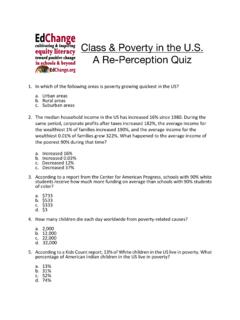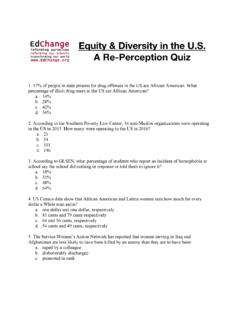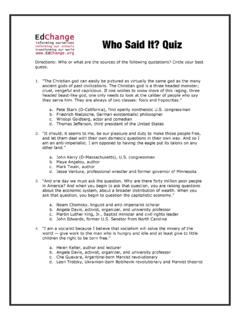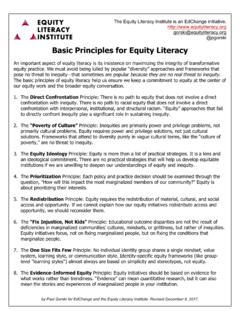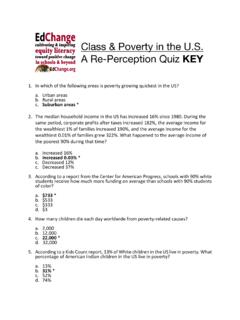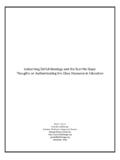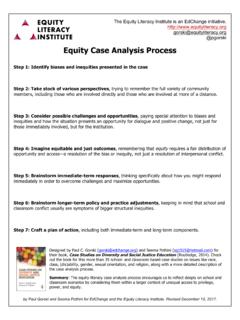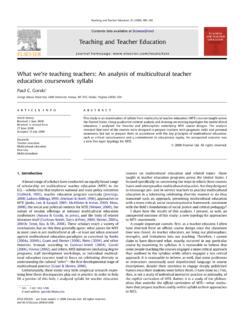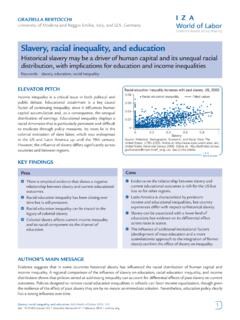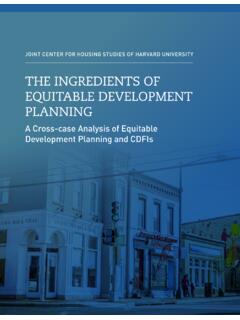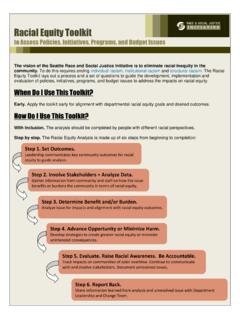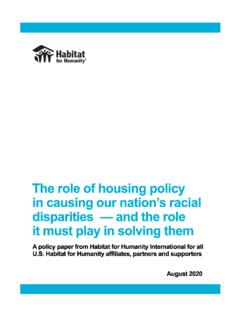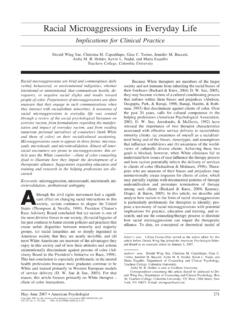Transcription of Avoiding Racial Equity Detours - EdChange
1 56 Ed u c a t i o n a l lE a dE r s h i p / ap r i l 2 0 1 9 Students experiencing racism can t wait for schools to move at their own pace and comfort level. Paul GorskiIn schools committed to Racial Equity , educators who resist anti-racist measures should feel uneasy, isolated on the outskirts of their schools institutional cultures. I mean this literally. The educators least invested in Racial Equity should wonder whether they belong. Sadly, research shows the inverse tends to be true in many schools, even when leaders claim Equity commit-ments.
2 Often, the educators most adamant about Racial Equity are cast to the margins of institutional culture. They are the ones feeling isolated, wondering whether they belong (Kohli, 2018; Picower, 2011). Colleagues call them troublemakers for naming what others refuse to name. Some are shushed or encouraged to adopt a color-blind perspective by Equity -skittish leaders. They are accused of being too political simply for pointing out conditions that harm families of color. Educators of color who raise these concerns tend to face even greater hostility, as Kohli (2018) documented through the nar-ratives of Racial -justice-oriented teachers of color.
3 They often are labelled militant or angry for telling the Racial Equity is a failure of Equity Racial Equity ReckoningIf the most emphatic Racial Equity advocates feel silenced and less central to institutional culture than their Equity -resistant colleagues, what we have from an Equity point of view is a sick institution. YULIA OGNEVA/SHUTTERSTOCK Avoiding Racial Equity DetoursAny meaningful accounting of Racial inequities in schools must reckon with this reality. Is our commitment real? Why do emphatic Equity advocates often face harsher repercussions for their advocacy than Equity heel-draggers face for their inaction?
4 Why is taking a strong, impassioned stand on racism interpreted as deviant while refusing to take a stand on racism is interpreted as in a developmental process (Mayorga & Picower, 2018)? Are we driven by authentic desires for Racial Equity ? Or are we content with rearranging inequities, hiding them behind multicultural arts fairs and diversity clubs (Au, 2017)? The disturbing reality is, in my 20 years of experience working with schools and districts on matters of Equity and justice, I ve found that most initiatives and strategies that pass for Racial Equity efforts in schools pose less of a threat to racism than to the possibility of Racial justice.
5 Following Olsson s (1997) accounting of the Detours white people follow to protect their privilege and avoid the messy work of Racial justice, I call these initiatives and strategies Equity Detours . The Detours vary in scope and nefariousness but share a function: They create an illusion of progress toward Equity while cementing, or even exacerbating, inequity. They can be more devastating than explicit racism because they do racism s work while consuming resources ostensibly earmarked for Racial Equity . They are the anti-anti-racism. For example, people who study Equity initiatives in schools have tracked educational leaders tendencies, in the name of Equity , either to implement deficit-oriented strategies, such as grit initiatives that obscure inequity (Kohn, 2014) or, worse, to build Equity efforts around debunked approaches that create more inequity, like the mindset of poverty.
6 Some educational leaders inexpli-cably continue to embrace the mindset of poverty even though it reinforces racialized stereotypes (Redeaux, 2011) and despite the fact that research clarified that there is no such thing as a mindset of poverty 50 years ago (Valentine, 1968). What all these types of initiatives and frameworks have in common is that they mask Racial inequity. They relieve us of the responsibility to name and eliminate the ways racism operates in our schools (Ladson-Billings, 2017). Rather than being paths to Equity , they are Detours around Racial Equity DetoursDescribed below are four Racial Equity Detours commonly embraced in schools,1 followed by Equity principles that can help educators avoid these Detours and build a more transformational Racial Equity approach.
7 1 Pacing-for-Privilege DetourThis detour underlies the other Detours . It speaks to the situation described earlier, wherein an Equity approach coddles the hesitancies of people with the least Racial Equity investment while punishing people with the most investment. In too many schools, the pace of Equity progress pri-oritizes the comfort and interests of people who have the least interest in that progress. Professional development in these schools appears designed to accommodate the feelings and fears of white educators in difficult Avoiding Racial Equity Detours58 Ed u c a t i o n a l lE a dE r s h i p / ap r i l 2 0 1 9 conversations about race rather than to advance Equity for students of color (Swanson & Welton, 2018).
8 A common Equity PD framework in these contexts is cultural compe-tence an approach that provides a way to talk about cultural dif-ferences without having to name or confront racism (Gorski, 2016a; Pon, 2009). Cultural competence is important. But by itself it s no threat to hard truth is, Racial Equity cannot be achieved with an obsessive commitment to meeting people where they are when where they are is fraught with Racial bias and privilege. Students, families, and edu-cators experiencing racism cannot afford to wait for us to saunter toward a more serious Racial Equity vision.
9 They cannot afford to wait, in particular, for all white educators to ease into Racial Equity commit-ments at a pace of our choosing while they suffer the consequences of our casualness. In schools committed to Equity , the time is now. We must prioritize Equity over the comfort of Equity -reluctant educators. We move on Racial justice first by honestly iden-tifying and addressing all the ways racism operates in our schools, and then we bridge the Equity hesitaters to our Equity vision. We refuse to equivocate on Racial justice. We find the will to implement, and hold one another accountable to, policy and practice changes today, rather than waiting for an elusive I make this argument to education leaders, they often emphasize the importance of staff buy-in.
10 I appreciate consensus-based leadership but not always when it comes to Equity . The school-to-prison pipeline is flowing (Annamma, Morrison, & Jackson, 2014). Students who are disproportionately targeted with assignment to special education, harsh applications of dis-cipline policy, unengaging pedagogy, and the sorts of school reform initiatives that redistribute access up the privilege continuum don t need consensus. They need justice. Start where we need to be: Equity is neither optional nor negotiable. This is who we are as a school; these are the values to which we will be held accountable.
